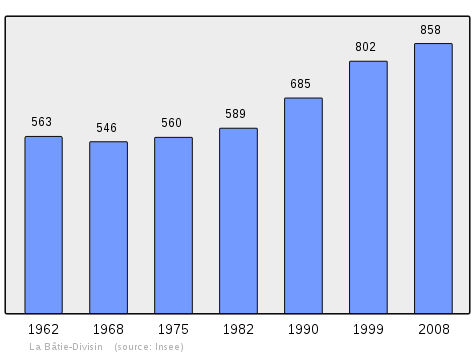La Bâtie-Divisin
| La Bâtie-Divisin | |
|---|---|
|
| |
 La Bâtie-Divisin | |
|
Location within Auvergne-Rhône-Alpes region  La Bâtie-Divisin | |
| Coordinates: 45°30′39″N 5°35′55″E / 45.5108°N 5.5986°ECoordinates: 45°30′39″N 5°35′55″E / 45.5108°N 5.5986°E | |
| Country | France |
| Region | Auvergne-Rhône-Alpes |
| Department | Isère |
| Arrondissement | La Tour-du-Pin |
| Canton | Chartreuse-Guiers |
| Intercommunality | Pays Voironnais |
| Government | |
| • Mayor (2008–2014) | Yvonne Rateau |
| Area1 | 10.51 km2 (4.06 sq mi) |
| Population (2010)2 | 897 |
| • Density | 85/km2 (220/sq mi) |
| Time zone | CET (UTC+1) |
| • Summer (DST) | CEST (UTC+2) |
| INSEE/Postal code | 38028 / 38490 |
| Elevation | 360–615 m (1,181–2,018 ft) |
|
1 French Land Register data, which excludes lakes, ponds, glaciers > 1 km² (0.386 sq mi or 247 acres) and river estuaries. 2 Population without double counting: residents of multiple communes (e.g., students and military personnel) only counted once. | |
La Bâtie-Divisin is a former commune in the Isère department in the Auvergne-Rhône-Alpes region of south-eastern France.[1] On 1 January 2016, it was merged into the new commune of Les Abrets-en-Dauphiné.[2]
The inhabitants of the commune are known as Récugnots or Récugnotes.[3]
Geography
La Bâtie-Divisin is located some 23 km east by south-east of Bourgoin-Jallieu and 15 km north of Voiron. Access to the commune is by the D1075 from Les Abrets in the north which passes through the village and continues south to Montferrat. The D28 goes south-east from the village to Saint-Geoire-en-Valdaine. The D50C links the south of the commune to Montferrat. The D50 branches from the D1075 at the southern border and goes south-west to Paladru. Apart from the village there are the hamlets of La Chapelle in the north and La Charrière in the south. The commune is mostly farmland with a little forest.[4][5]
The Ruisseau de Corbassière rises in the south of the commune and flows north through the centre of the commune from south to north to join the Bièvre north-east of the commune. The Ruisseau des Rajans forms the south-eastern border of the commune as it flows north-east to join the Ruisseau de Gorgeat, which rises in the commune, and it becomes the Ruisseau de la Corbière.[4][5]
Mapping
A list of online mapping systems can be displayed by clicking on the coordinates (latitude and longitude) in the top right hand corner of this article.
Neighbouring communes and villages
 |
Charancieu | Les Abrets | Pressins |  |
| Saint-Ondras | |
Saint-Jean-d'Avelanne | ||
| ||||
| | ||||
| Valencogne | Montferrat | Velanne |
Toponymy
La Bâtie-Divisin appears as Recoing on the 1750 Cassini Map[6] and the same on the 1790 version.[7]
Administration
| From | To | Name | Party | Position |
|---|---|---|---|---|
| 2001 | 2020 | Yvonne Rateau |
(Not all data is known)
Demography
In 2010 the commune had 897 inhabitants. The evolution of the number of inhabitants is known from the population censuses conducted in the commune since 1793. From the 21st century, a census of communes with fewer than 10,000 inhabitants is held every five years, unlike larger communes that have a sample survey every year.[Note 1]
| 1793 | 1800 | 1806 | 1821 | 1831 | 1836 | 1841 | 1846 | 1851 |
|---|---|---|---|---|---|---|---|---|
| 773 | 970 | 1,101 | 1,203 | 1,234 | 1,290 | 1,364 | 1,426 | 1,415 |
| 1856 | 1861 | 1866 | 1872 | 1876 | 1881 | 1886 | 1891 | 1896 |
|---|---|---|---|---|---|---|---|---|
| 1,318 | 1,303 | 1,321 | 1,281 | 1,260 | 1,165 | 1,131 | 1,101 | 1,067 |
| 1901 | 1906 | 1911 | 1921 | 1926 | 1931 | 1936 | 1946 | 1954 |
|---|---|---|---|---|---|---|---|---|
| 986 | 961 | 907 | 770 | 739 | 700 | 668 | 655 | 611 |
| 1962 | 1968 | 1975 | 1982 | 1990 | 1999 | 2006 | 2010 | - |
|---|---|---|---|---|---|---|---|---|
| 563 | 546 | 560 | 589 | 685 | 802 | 897 | - |
Sources : Ldh/EHESS/Cassini until 1962, INSEE database from 1968 (population without double counting and municipal population from 2006)

Culture and Heritage
Religious heritage
- The Parish Church
Environmental heritage
The commune has two Zones of natural ecological interest, flora and faune:
- The Humid woodlands of the Ruisseau de la Corbassière
- The Forests bordering the Rajans, Caron, and la Combe Pigna streams
See also
Notes and references
Notes
- ↑ At the beginning of the 21st century, the methods of identification have been modified by Law No. 2002-276 of 27 February 2002, the so-called "law of local democracy" and in particular Title V "census operations" allows, after a transitional period running from 2004 to 2008, the annual publication of the legal population of the different French administrative districts. For communes with a population greater than 10,000 inhabitants, a sample survey is conducted annually and the entire territory of these communes is taken into account at the end of the period of five years. The first "legal population" after 1999 under this new law came into force on 1 January 2009 and was based on the census of 2006.
References
- ↑ La Bâtie-Divisin on Lion1906
- ↑ Arrêté préfectoral 30 December 2015
- ↑ Inhabitants of Isère (French)
- 1 2 3 La Bâtie-Divisin on Google Maps
- 1 2 La Bâtie-Divisin on the Géoportail from National Geographic Institute (IGN) website (French)
- ↑ Recoing on the 1750 Cassini Map
- ↑ Recoing on the 1790 Cassini Map
- ↑ List of Mayors of France (French)
External links
| Wikimedia Commons has media related to La Bâtie-Divisin. |